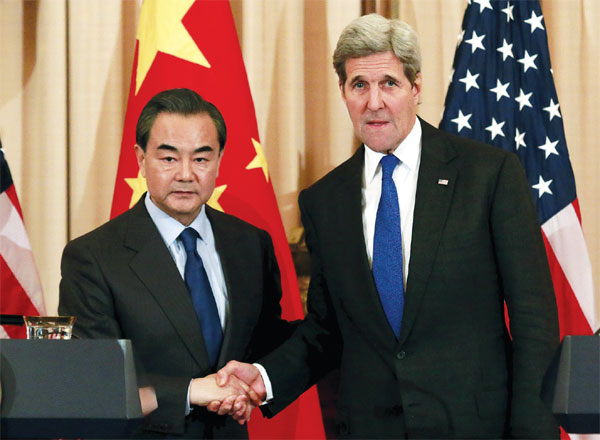Wang: Progress on DPRK nuclear issue
Military activity in the South China Sea and the Democratic People's Republic of Korea's nuclear missile program were two of a long list of topics covered by Chinese Foreign Minister Wang Yi and US Secretary of State John Kerry when they met in Washington on Tuesday.
Wang revealed that the United Nations Security Council has made important progress in its consultation on a new resolution regarding the DPRK.
"We are looking at the possibility of reaching agreement on the draft resolution and passing it in the near future," he said in a joint press conference after the talk.
|
Foreign Minister Wang Yi and US Secretary of State John Kerry shake hands at a joint news conference after their meeting at the State Department in Washington on Tuesday. See more \> p2 Yuri Gripas / Reuters |
Wang said China and the US do not accept DPRK's nuclear missile program. "We do not recognize DPRK as a nuclear weapon state," said Wang. It was the third meeting for the two in a month.
He said that once the agreement is passed, it will effectively limit further progress of the DPRK's nuclear missile program. But Wang emphasized that the resolution cannot provide a fundamental solution to the Korean nuclear issue.
Kerry agreed, saying "there is no question that if the resolution is approved, it will go beyond anything that we have previously passed".
Wang and Kerry agreed that the goal is to go back to negotiations. Wang talked about China's new basic proposal of pursuing in parallel tracks the denuclearization of the Korean Peninsula and replacing the Korean armistice with a peace agreement.
He said China is open to new ideas, but added that the parallel track approach is a reasonable one. It highlights the overriding goal of denuclearizing the peninsula at the same time it seeks to address the major concerns of the various parties.
Wang said he and Kerry believe that the situation on the Korean Peninsula needs to be monitored very closely in the coming two months.
"Various factors of instability might intertwine and have an impact, so under that situation it's very important that the various parties have more dialogue so as to prevent the heightening of tension or escalation of the situation," he said.
He emphasized the need to prevent the situation on the peninsula from spinning out of control.
"That is a scenario that neither China nor the other parties wish to see, so China hopes that the relevant parties will not take any action that might heighten tension on the peninsula," he said.
Wang also reiterated China's stance on the South China Sea, saying he and Kerry agreed to have further dialogue on the issue to deepen mutual understanding.
"In particular, it's important to prevent any miscalculation," Wang said.
While Kerry expressed his concerns over the militarization in the South China Sea by some countries, Wang said China, the US and ASEAN countries all have committed to non-militarization. But he noted that non-militarization is not the responsibility of one party alone.
"It's something that we share," Wang said.
China does not hope to see any more close-up military reconnaissance missions or the dispatch of missile destroyers or strategic bombers to the South China Sea, according to Wang, clearly referring to the high-profile US military presence in the region.
While frictions are making headlines, Wang said that China and the US have far more common interests than areas of disagreement.
One of the topics for the two top diplomats is a series of high-level meetings this year. Wang said China supports the US in hosting the fourth Nuclear Security Summit in Washington in late March and early April, and the US supports China's hosting of the G20 summit in East China's Hangzhou in September.
The two sides agreed to work together to ensure the success of the next rounds of the Strategic and Economic Dialogue (S&ED), the High-Level Consultation on People-to-People Exchange (CPE), the Joint Commission on Commerce and Trade (JCCT) and the joint high-level dialogue on combating cybercrime and related issues.
chenweihua@chinadailyusa.com





















